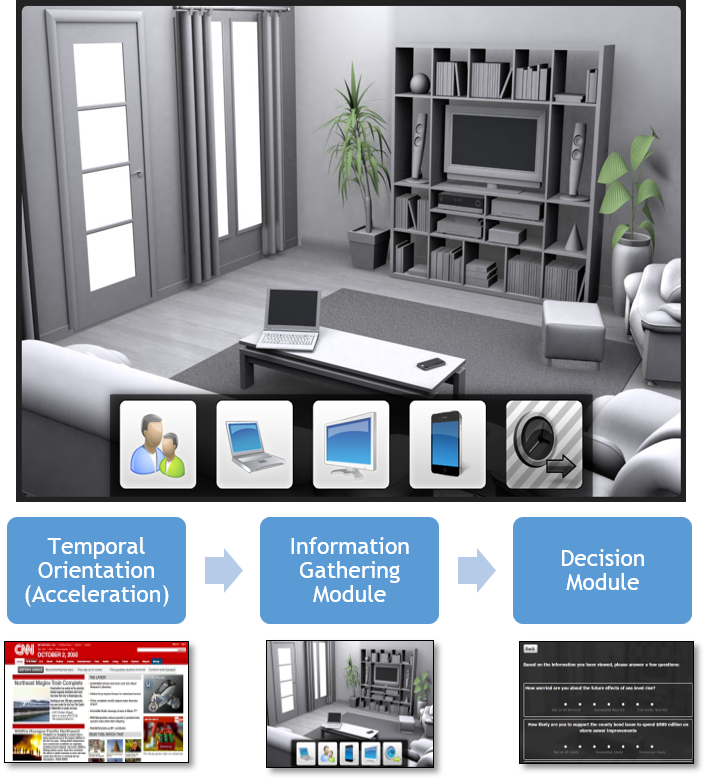Project C2-1: Homeowner Adoption of Sustainable Urban Water Solutions
Jessica Bolson, PhD
Florida International University
Southeast Environmental Research Center
Strategies for improved flood resilience, stormwater management, distributed infiltration, green infrastructure, and community scale reuse of reclaimed and graywater are at varying stages of development and implementation. Technological innovations mean little if they are not widely adopted by homeowners and communities. Understanding household scale adoption of these different strategies, and the factors that influence it, is critical to the identification of promising pathways toward sustainability. However, understanding how adoption decisions are made, and might be influenced, is challenging for an array of reasons that include the distant time horizons involved, the lack of contemporary understanding of the technology, and the ultimate dependence of adoption on social and media factors that are difficult to forecast. The key questions to be addressed include:
- How likely are different technological solutions to be adopted by current and future households?
- How can those strategies be refined to increase the chances of large-scale uptake?
- What are the most effective methods of education and communication for these different water technologies?
The purpose of this project is to clarify and learn about how adoption decisions are made by exploring the ability of dynamic information acceleration (DII) to model how future adoption decisions will likely be made.
Through household scale surveys, which are embedded in computer simulations, (using a program developed for the project called Choiceflow) we will collect data including:
- Information on individual preferences about:
- Technological innovations
- Municipal water policies
- Conservation/adaptation practices
- Willingness to pay for different water technologies
- Data on individual information seeking behaviors
We will conduct surveys across the six UWIN regions and plan to administer multiple rounds of surveys to examine different questions.
The Choiceflow Model
The research uses an innovative approach that guides participants through a computer simulation program, Choiceflow, to simulate future conditions where choices about technology/policy must be made (see above). By studying individuals’ decision-making behaviors, such as information seeking behaviors, investment choices, support for policy, and perceptions of strategies/technologies, we will improve our understanding of the likelihood of adoption of different urban water management practices and the barriers that might inhibit widespread adoption. Using this information, we will suggest strategies for policy and investment that incorporate peoples’ preferences and decision-making biases, making them more likely to be accepted.
Related Materials
Jessica Bolson, PhD – Principal Investigator
Assistant Professor
Earth & Environment
Florida International University
Voice: (917) 957-9587
Email: jbolson@fiu.edu
Dr. Bolson’s research primarily focuses on the intersection of environmental governance and climate science, with particular emphasis on water resource decision-making under uncertain climate conditions. She is especially interested in the co-production of scientific information and policy within the hydroclimate context, including the roles of integrated models, stakeholder-scientist interactions, and climate information use in decision-making. Her work investigates topics including the use of climate information to foster adaptation in the management of water resources, individual and group decision-making in areas of natural resource management, and participation in environmental decision-making. In addition to Jessica’s research, she has recently taught courses in interdisciplinary climate studies, regional water resource management, and U.S. environmental policy. Jessica received a Ph.D. in Environmental Science and Policy from University of Miami in 2010. Her dissertation focused on understanding the effects of climate change on freshwater resources and their management in South Florida. In 2008, Jessica worked as a Gubernatorial Fellow in the Florida Department of Environmental Protection where she crafted a statewide policy for climate change and water resource management. Jessica has also completed an M.A. at Columbia University in Climate and Society, an M.Ed. at NYU in Biology Education, and a B.A. in Environmental Science at Barnard College. Prior to her graduate studies, Jessica taught high school biology in NYC.
Robert Meyer, PhD – Co-Director, Risk Management and Decision Processes Center
Frederick H. Ecker/MetLife Insurance Professor
Professor of Marketing
Wharton School, University of Pennsylvania
Email: meyerr@wharton.upenn.edu
Voice: (215) 898-1826
Kenneth Broad – Research Scientist
Email: kbroad@rsmas.miami.edu
David Letson – Research Scientist
Email: dletson@rsmas.miami.edu
Timothy Kirby – Graduate Student
Email: tkirby@fiu.edu


